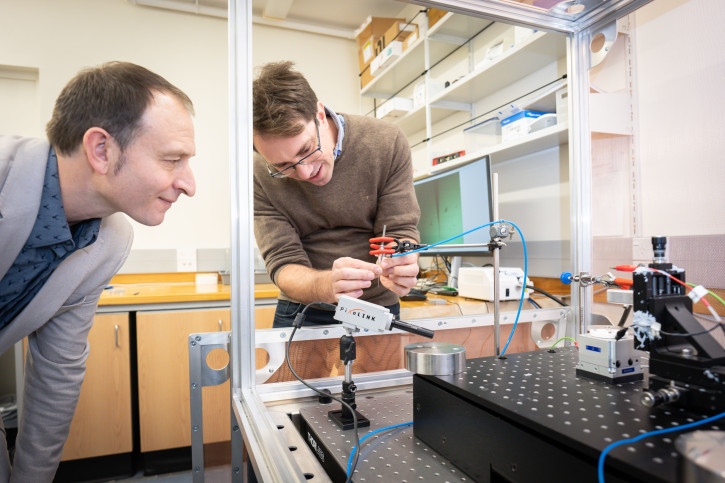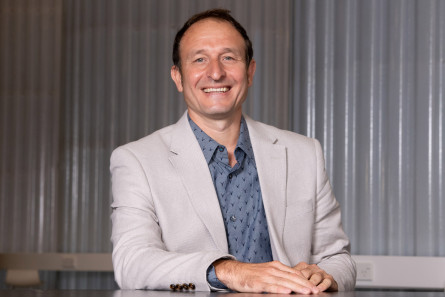
Commercialisation Manager Roger Zemp and Dr Kim McKelvey
In the transition to a carbon free society, understanding how efficiently electrochemical reactions occur on different surfaces will be a game changer.
At the moment, our understanding is limited – and that’s holding back a wide range of clean technologies.
“Electrochemistry – using electricity to drive chemical reactions – is at the heart of technologies that underpin our transition to clean energy like batteries, electric vehicles and hydrogen fuel cells,” explains Dr Kim McKelvey, a Senior Lecturer in Victoria University of Wellington’s School of Chemical and Physical Sciences.
He’s invented a novel technology that makes it possible to measure electrochemical reactions across surfaces quickly and cheaply.
He’s working with Wellington UniVentures to define a market opportunity for his invention and has recently joined the KiwiNet Emerging Innovator (EI) programme to grow his entrepreneurial skills.
Joining the Emerging Innovator Programme
Kim is a keen inventor with a natural desire to see his research used in the real world. “I’m driven by discovering, making, doing new things. And I like seeing science have an impact – it's a great feeling inventing something that someone finds useful.”
Senior Commercialisation Manager Roger Zemp, who has been supporting Kim on his entrepreneurial journey, says, “Kim is a brilliant researcher with a commercial bent. He already approaches research with a view to addressing real challenges. It’s no exaggeration to say that his invention has the potential to solve one of the pressing problems in electrochemistry.
“Providing Kim with the tools to develop his commercial acumen through the EI programme will be invaluable to his future career.”
The project
Kim boils down his research into one question: “What is it about a surface that makes a reaction go faster or slower?”
It may seem simple, but it's a big question: in the field of electrochemistry understanding this is considered the holy grail.
Currently, there is no simple way to discover or design surfaces optimized for the electrochemical reactions they host. “It’s a bit of a guessing game. If you wanted to test the efficiency of a surface, you’d first need to build the device – battery or whatever it is – and then test how efficiently it works.”
Kim’s invention is a miniscule pipette that sweeps across a material, measuring the electrical signals that tell us what chemical reactions are happening on its surface. It then sends the information to specially designed software that creates a map of the surface. “This allows you to quickly and cheaply compare how well different surfaces conduct electrochemical reactions under almost real-world conditions, without having to build multiple versions of the whole device.”
It’s nano technology with near limitless potential, but Kim is particularly interested in applying it to build more efficient devices that convert electricity from renewable sources into fuel.
“Being able to convert electricity into sustainable fuel with maximum efficiency would significantly speed up our transition to clean energy.”
At the moment, Kim’s invention is a prototype that needs to be shaped up to a point where industry will want to invest.
How will the EI programme support the project
“We think we have invented something really useful, but does industry think it’s useful?” asks Kim. He’s hoping the EI programme will help him figure out which questions to ask – and of whom – that will get to the bottom of this.
“Having a clear understanding of what industry is looking for will help us determine how we need to adapt our technology to fit a niche where it can have most impact.”
Kim is also looking forward to exploring the different paths to market for his invention – whether that’s spinning out a new company or licensing the technology to others.
As someone who has always wanted to work at the interface of industry and academia, Kim is excited about the possibilities of commercialisation to tackle global clean energy challenges.
Wellington UniVentures will continue to support Kim on his journey from academic to entrepreneur. Roger adds, “Kim is eager to work closely with industry and has a knack for inventing things that solve real-world challenges. Once he has developed the commercial acumen to sit alongside his research acumen, there will be no stopping him.”

